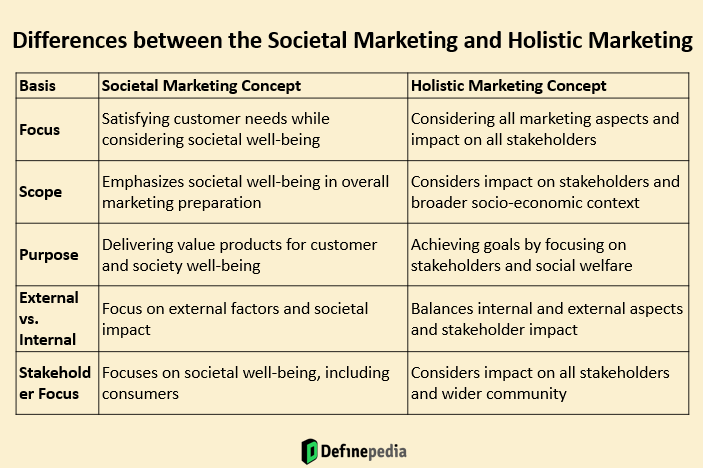Introduction
The societal marketing concept is about companies thinking about what’s good for people and the planet, not just about making money. It’s like thinking about how toys or food affect everyone, not just if they sell well.
Companies need to be nice to the world by not hurting it and by doing good things. Holistic marketing is when companies look at everything they do as a big puzzle. They don’t just focus on selling things, but also on how the business works together.
They treat workers well, make customers happy, and think about how their actions affect nature. It’s like putting all the pieces of the puzzle together to make a good and kind business.
The Holistic Marketing Concept is an approach to marketing that considers the business as a whole, rather than focusing on individual marketing activities. It recognizes that marketing is just one part of a larger business system and that marketing decisions need to be integrated with other business functions such as finance, operations, and human resources.

Holistic marketing also work on the broader social, economic, and environmental context in which the business operates.
On the other hand, the Societal Marketing Concept is a marketing philosophy that places the welfare of society above the interests of the company or the individual consumer. It recognizes that businesses have a responsibility to society beyond just making profits.
Companies need to consider the long-term impact of their marketing activities on society and the environment, and work to minimize any negative impact while maximizing positive impact. So this includes considering issues such as sustainability, social responsibility, and ethical business practices.
Differences between the Societal Marketing and Holistic Marketing
| Factor | Societal Marketing Concept | Holistic Marketing Concept |
| Focus | Satisfying customer needs while considering societal well-being | Considering all marketing aspects and impact on all stakeholders |
| Scope | Emphasizes societal well-being in overall marketing preparation | Considers impact on stakeholders and broader socio-economic context |
| Purpose | Delivering value products for customer and society well-being | Achieving goals by focusing on stakeholders and social welfare |
| External vs. Internal | Focus on external factors and societal impact | Balances internal and external aspects and stakeholder impact |
| Stakeholder Focus | Focuses on societal well-being, including consumers | Considers impact on all stakeholders and wider community |
| Social Responsibility | Emphasizes social, environmental impact minimization | Considers social, economic, environmental context in decisions |
| Marketing Mix | Focus on product, with prominence on societal needs | Considers entire marketing mix with holistic context |
| Goal Alignment | Aligns organization goals with societal well-being | Aligns goals with social welfare and stakeholder objectives |
| Customer-Centric | Focuses on customer needs and social/ethical considerations | Considers all aspects and stakeholder impact comprehensively |
| Long-Term vs. Multi-Dimensional | Considers long-term societal and environmental impact | Considers broader impact on stakeholders and socio-economic context |
In summary, the Societal Marketing Concept focuses on satisfying the needs of customers while considering the long term well-being of society as a whole, with a focus on social responsibility and ethical considerations. On the other hand, the Holistic Marketing Concept takes a comprehensive approach and considers all…
Was this helpful?
0 / 0